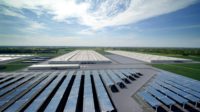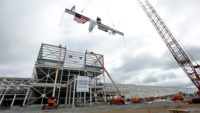Upping its investment in North Carolina for the second time, Toyota North America is adding $2.1 billion to prepare infrastructure for its under-construction electric vehicle battery manufacturing plant in the town of Liberty—bringing its total investment there to $5.9 billion.
The project was Initially announced in 2021 as a $1.3 billion investment and bolstered in August 2022 with an additional $2.5 billion.
The plant will create batteries for a new generation of vehicles at the central North Carolina location, having capability to produce enough lithium-ion batteries for 200,000 all-electric and plug-in hybrid electric vehicles, Toyota says.
Construction has started on the project, says Emily Holland, Toyota spokesperson, with production expected to begin in 2025. Toyota plans to produce 1.2 million batteries per year at the plant, says Christopher Reynolds, chief administrative officer of Toyota Motor Corp. of North America.
“The future of mobility is electrification and the Greensboro-Randolph Megasite is the ideal location to make that future a reality,” says Ted Ogawa, CEO of Toyota Motor North America in a statement. “North Carolina offers the right conditions for this investment, including the infrastructure, high-quality education system, access to a diverse and skilled workforce, and a welcoming environment for doing business.”
“Toyota’s significant investment in our state, now nearly $6 billion, is ... more evidence that North Carolina is a leader in the clean energy economy,” said Gov. Roy Cooper in Toyota's announcement.
The state also approved a job development investment grant that would refund the company $79.1 million in employee withholding taxes over 20 years when it meets hiring and investment targets. The current state budget also includes $135 million to benefit this project – $100 million for site work and wetlands mitigation at the site and $35 million for associated road construction and wetlands mitigation elsewhere in Randolph County.
The Greensboro City Council and county Board of Commissioners earlier this year also approved economic incentive packages at the Greensboro-Randolph Megasite, the plant's locatoin.
The project is being managed by a new Toyota venture called Toyota Battery Manufacturing, North Carolina, also based at the Greensboro-Randolph Megasite.
ENR Southeast's 2022 Top Starts ranking lists the project as breaking ground last July 1, with Kajima Building and Design Group as designer and general contractor.
DOE OKs $9.2B for Ford’s BlueOval Project
The U.S. Energy Dept. (DOE) also announced another large investment in electric vehicle infrastructure in the Southeast, awarding a conditional loan commitment of up to $9.2 biillion to BlueOval SK LLC for construction of three manufacturing plants to produce batteries for Ford Motor Co.’s BlueOval project in Tennessee and Kentucky—a joint venture of the carmaker and South Korean battery maker SK Innovation.
DOE's Loan Programs Office said June 22 the loans would fund work at two plants at the Kentucky site, and one at the Tennessee location near Memphis, which together will enable more than 120 gigawatt hours of domestic battery production annually.
It is the largest single DOE loan made and largest indirect government support for a U.S. auto manufacturer since the Great Recession.
The funds are part of DOE's Advanced Technology Vehicles Manufacturing Loan Program, which provides loans to projects related to fuel-efficient vehicles and eligible component manufacturing. The project must reach critical milestones and certain conditions before DOE issues the final loan, but these were not disclosed.
The 3,600-acre Tennessee project called BlueOval City broke ground last July, according to ENR Southeast's Top Starts ranking, with Walbridge as general contractor, and SSOE Group and Ghafari Associates as designers. It will be Ford's largest manufacturing complex.
Barton Malow is general contractor for Ford's BlueOval SK Battery Park project in Kentucky, with support from Lexington, Ky.-based Gray Construction, Greg Christensen, Ford’s electric vehicle footprint manufacturing director told ENR.
Ford said it plans to produce 2 million EVs annually by the end of 2026.
The DOE funds support President Joe Biden’s Investing in America agenda, said DOE, including the goal of electric vehicles making up at least half of all new car sales in the U.S. by 2030, net-zero electricity by 2035 and a net-zero economy by 2050.




